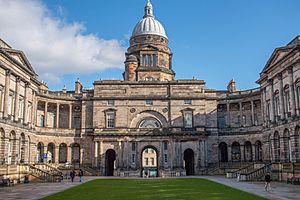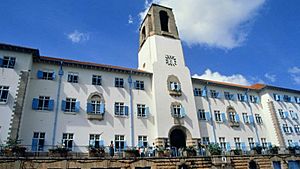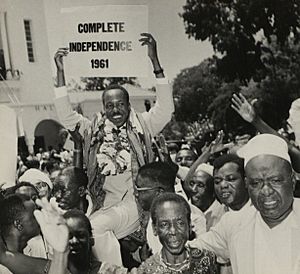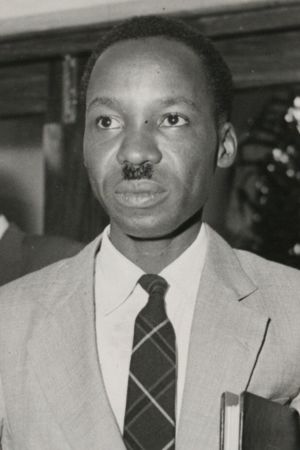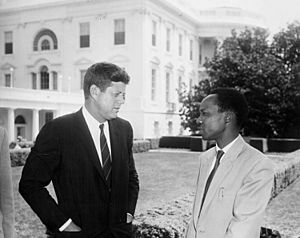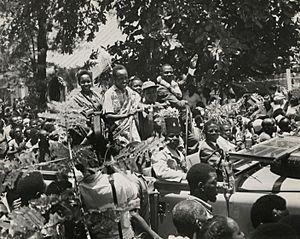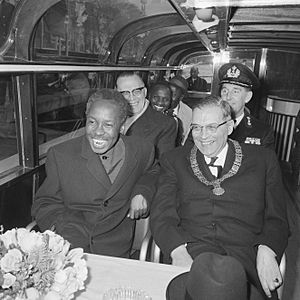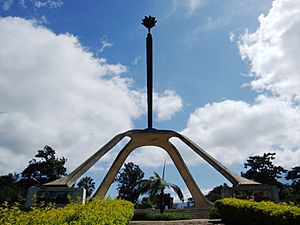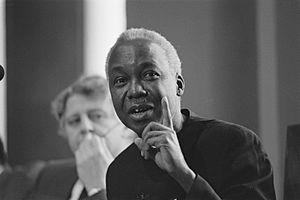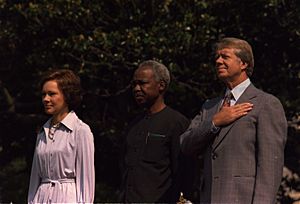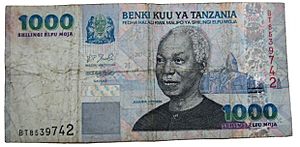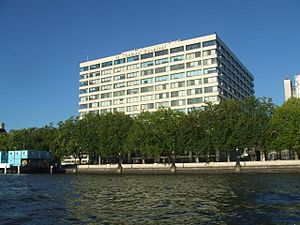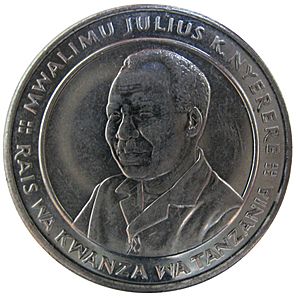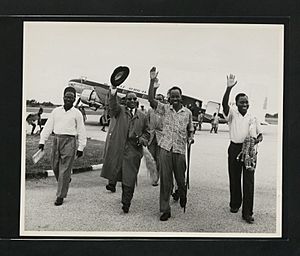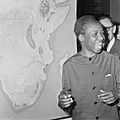Julius Nyerere facts for kids
Quick facts for kids
Mwalimu
Julius Nyerere
|
|
|---|---|
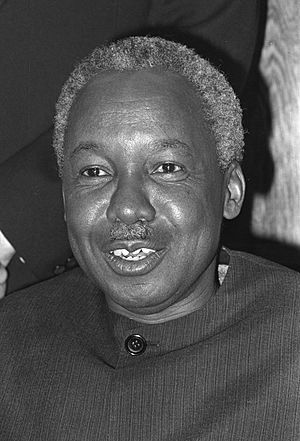
Nyerere in 1975
|
|
| 1st President of Tanzania | |
| In office 29 October 1964 – 5 November 1985 |
|
| Prime Minister |
|
| Vice President |
|
| Preceded by |
|
| Succeeded by | Ali Hassan Mwinyi |
| President of the United Republic of Tanganyika and Zanzibar | |
| In office 26 April 1964 – 29 October 1964 |
|
| Vice President |
|
| President of Tanganyika | |
| In office 9 December 1962 – 26 April 1964 |
|
| Prime Minister | Rashidi Kawawa |
| Prime Minister of Tanganyika | |
| In office 1 May 1961 – 22 January 1962 |
|
| Monarch | Elizabeth II |
| Preceded by | Himself (as Chief Minister) |
| Succeeded by | Rashidi Kawawa |
| Chief Minister of Tanganyika | |
| In office 2 September 1960 – 1 May 1961 |
|
| Monarch | Elizabeth II |
| Governor | Sir Richard Turnbull |
| Preceded by | Position established |
| Succeeded by | Himself (as Prime Minister) |
| Personal details | |
| Born |
Kambarage Nyerere
13 April 1922 Butiama, Mara Region, Tanganyika Territory |
| Died | 14 October 1999 (aged 77) London, England |
| Resting place | Butiama, Mara Region, Tanzania |
| Nationality | Tanzanian |
| Political party |
|
| Spouse |
Maria Nyerere
(m. 1953) |
| Children |
8
Andrew Burito Anna Watiku Anselm Magige John Guido (1957–2015) Charles Makongoro (b. 1959) Godfrey Madaraka Rosemary Nyerere (1961–2021) Pauleta Nyabanane |
| Alma mater |
|
| Profession | Teacher |
| Awards |
|
Julius Kambarage Nyerere (Swahili pronunciation: [ˈdʒuːlius kɑmbɑˈɾɑgɛ ɲɛˈɾɾɛ]; 13 April 1922 – 14 October 1999) was an important leader from Tanzania. He was an activist who fought against colonialism (when one country controls another). He was also a politician and a thinker.
Nyerere served as the prime minister of Tanganyika from 1961 to 1962. Then, he became its president from 1962 to 1964. After that, he led the new country of Tanzania as president from 1964 to 1985. He helped create and lead two major political parties: the Tanganyika African National Union (TANU) and its later version, Chama Cha Mapinduzi. He led these parties from 1954 to 1990.
Nyerere believed in African nationalism, which means Africans should govern themselves. He also believed in African socialism, a way of organizing society where people work together for the good of everyone. He developed a special idea called Ujamaa, which means "familyhood" in Swahili. In Tanzania, people deeply respect him. They often call him Mwalimu, which means "teacher" in Swahili. He is also known as the "Father of the Nation."
Contents
Early Life and Education
Julius Kambarage Nyerere was born on April 13, 1922. His birthplace was Mwitongo, a village in Butiama, in Tanganyika's Mara Region. He was one of 25 children who survived from his father, Nyerere Burito. His father was the chief of the Zanaki people. Julius's mother, Mugaya Nyang'ombe, was one of his father's 22 wives.
When he was born, Nyerere was first named "Mugendi." This name meant "Walker" in the Zanaki language. Later, his name was changed to "Kambarage." This was the name of a female rain spirit. Nyerere grew up following the Zanaki's traditional beliefs, which included many gods. He lived in his mother's house and helped farm crops like millet, maize, and cassava. He also helped herd goats and cattle with other boys. As the chief's son, he learned about leadership. Living in a large family group taught him about community living. These early experiences shaped his later political ideas.
The British government, which ruled Tanganyika at the time, wanted chiefs' sons to go to school. They thought this would help keep the traditional leadership system going. In February 1934, Nyerere started school at the Native Administration School in Mwisenge, Musoma. This school was about 35 kilometers from his home. Most children in his village could not afford to go to primary school. He had to learn Swahili at school, as it was the language of instruction. Nyerere was a very good student. After six months, his test scores were so high that he skipped a grade. He preferred reading in his dorm to playing sports.
He finished elementary school in 1936. His final exam results were the best in his region. Because he did so well, he received a government scholarship. This allowed him to attend the special Tabora Government School, a secondary school in Tabora. There, he still avoided sports. However, he helped start a Boy Scout group after reading Scouting for Boys. Other students remembered him as ambitious and wanting to be the best in class. He used the school library to become very good at English. He was also very active in the school's debating club. Teachers wanted him to be head prefect, but the headmaster said no. The headmaster thought Nyerere was "too kind" for the job.
Following Zanaki tradition, Nyerere was set to marry a girl named Magori Watiha. She was only three or four years old at the time. His father had chosen her for him. They continued to live separately. In March 1942, during Nyerere's last year at Tabora, his father died. The school did not let him go home for the funeral. Nyerere's brother, Edward Wanzagi Nyerere, became the new chief. After this, Nyerere decided to become a Roman Catholic. He took the name "Julius" when he was baptized. However, he later said it was "silly" for Catholics to "take a name other than a tribal name" when baptized.
After finishing school, he studied at Makerere College in Uganda. Then, he went to Edinburgh University in Scotland. He was one of only two black students from British East Africa studying in Scotland.
Nyerere's Political Career
In 1952, Nyerere returned to Tanganyika. He married Maria Gabriel and worked as a school teacher. In 1954, he helped create the TANU party. Through this party, he worked to make Tanganyika independent from the British Empire. Nyerere was inspired by Mahatma Gandhi, a leader from India. He taught people to use non-violent protests to reach their goal of independence.
Nyerere was elected to the Legislative Council in 1958–1959. Then, he led TANU to win the 1960 general election. He became the Prime Minister of Tanganyika. After talks with the British, Tanganyika gained independence in 1961. In 1962, Tanganyika became a republic, and Nyerere was elected its first president. His government worked to remove colonial influences. They also aimed to have more Africans in government jobs. He wanted to unite Africans with the country's Asian and European people.
Nyerere supported having a one-party state, where one political party leads the country. He also tried to create an East African Federation with Uganda and Kenya. This idea was part of his Pan-Africanism belief, which aimed to unite African countries. However, this federation did not happen. In 1963, there was a small rebellion in the army. British help was needed to stop it.
After the Zanzibar Revolution in 1964, the island of Zanzibar joined with Tanganyika. Together, they formed the country of Tanzania. After this, Nyerere focused more on national self-reliance and socialism. Self-reliance means a country can depend on itself. Socialism is an idea where the community owns and controls important things like banks and industries. While his ideas were different from Mao Zedong's China, Tanzania became close with China.
In 1967, Nyerere announced the Arusha Declaration. This document explained his vision for ujamaa. Banks and other big businesses were taken over by the government. Education and healthcare greatly improved. He also focused on farming by creating communal farms. These were farms where people worked together. However, these changes sometimes made it harder to produce enough food. This meant some areas needed food aid from other countries.
Nyerere's government also helped groups fighting against white-minority rule in southern Africa. He led Tanzania in a war against Uganda from 1978 to 1979. This war led to the removal of Ugandan President Idi Amin. In 1985, Nyerere stepped down as president. Ali Hassan Mwinyi took his place. Mwinyi changed many of Nyerere's policies. Nyerere remained the leader of Chama Cha Mapinduzi until 1990. He supported changing to a multi-party system, where many parties can exist. Later, he helped mediate (find a peaceful solution) to the Burundian Civil War. These talks continued until Nyerere's death. Nelson Mandela, a former South African president, took over his role.
In 1997, Nyerere visited Edinburgh for the last time. He gave a speech and taught classes at the university. The government and army helped build Nyerere a house in his home village. It was finished in 1999, but he only stayed there for two weeks before he passed away.
Death
Julius Nyerere died on October 14, 1999. His wife and six of his children were with him. Benjamin Mkapa, who was Tanzania's president at the time, announced Nyerere's death on TV. He also declared a 30-day period of mourning. Tanzanian radio played funeral music, and TV showed videos of Nyerere.
A special church service, called a requiem mass, was held at Westminster Cathedral in London. Then, his body was flown back to Tanzania. Crowds of people watched as his body was carried through Dar es Salaam. It was then taken to his home near the coast. Another requiem mass was held at St Joseph's Cathedral. A large funeral took place at the National Stadium. Hundreds of people walked past his body as it lay in state. Finally, his body was flown to Butiama and buried there.
Nyerere's Ideas: Ujamaa
Nyerere's main idea was called Ujamaa. It was a type of African socialism. Many of his political beliefs grew while he was studying in Edinburgh. He said he "evolved the whole of my political philosophy while I was there." In Edinburgh, he learned from ideas like classical liberalism and Fabian socialism. He also studied the writings of Adam Smith and John Stuart Mill.
Nyerere wrote and spoke a lot throughout his life. He left behind many writings about his ideas. One expert, Issa G. Shivji, said Nyerere was "a great man of principle." But he also said that when Nyerere was in power, he sometimes used practical ways to get things done. Shivji believed Nyerere was good at explaining his actions using strong principles.
Against Colonialism and for African Unity
Nyerere was an African nationalist. This means he strongly believed that African countries should be free and govern themselves. He disliked colonialism and felt it was his duty to fight against it in Tanganyika.
Nyerere also believed in Pan-Africanism. This is the idea that all African people and countries should be united and work together.
Democracy and the One-Party System
Nyerere believed strongly in democracy, which means "government by the people." He said that ideally, democracy is when "all the people – settle their affairs through free discussion." He valued the ideas of liberal democracy, but he wanted to make democracy fit African countries.
He believed that African countries after colonialism were different from Western countries. So, they needed a different way of governing. He supported a system where people elected representatives, but within a one-party state. He thought having many different political parties would cause problems and make the country unstable.
Nyerere criticized the two-party system he saw in Britain. For him, true democracy meant protecting people's political and civil freedoms, not just having many parties. He believed that freedom of speech was possible even in a one-party state. However, some critics argued that his opposition to other parties was not very democratic.
Nyerere often talked about freedom. His main collections of speeches and writings were titled Freedom and Unity, Freedom and Socialism, and Freedom and Development. His idea of freedom was influenced by the German philosopher Immanuel Kant. Like Kant, Nyerere thought the government's job was to promote freedom for individuals.
African Socialism
Nyerere was a socialist. His ideas about socialism were connected to his ideas about democracy. He promoted "African socialism." Nyerere believed that socialism was not a new idea for Africa. He thought it reflected traditional African ways of life. He felt that a "socialist attitude of mind" already existed in traditional African society.
In 1962, he said, "We, in Africa, have no more need of being 'converted' to socialism than we have of being 'taught' democracy. Both are rooted in our past." He saw the traditional African village as a model for an ideal society. Nyerere said that in most of Africa, "we have to begin our socialism from tribal communalism." This means starting from communities where people shared things.
He wanted a society where what was good for individuals was also good for everyone. He believed this could happen because people ultimately want to help the community. He thought it was important to balance individual rights with duties to society. He felt Western countries focused too much on individual rights.
Nyerere strongly believed in the rule of law. This means everyone, including leaders, must follow the law. He also stressed the importance of hard work. Nyerere used the idea of tradition to convince Tanzanians of his ideas. He said Tanzania could only grow "through the religion of socialism and self-reliance." He repeated that freedom, equality, and unity were key to his African socialism.
Personality and Personal Life
Nyerere was described as a "slight, wiry man" with a high forehead. People said he was a great speaker and debater. He was able to explain his complex ideas in a simple, clear way.
Nyerere was a humble person. He was shy about the "personality cult" that grew around him. A personality cult is when followers treat a leader like a hero. He did not want statues built of him. In 1963, he asked his colleagues to help him stop "the disease of pomposity" in Tanzania. Pomposity means being overly grand or self-important. As President, he did not like to be called "Your Excellency" or "Dr Nyerere." Most staff called him "Mzee," a Swahili word meaning "old man." Nyerere lived simply and disliked luxury. In his later years, he always flew in economy class.
People who knew him described him as down-to-earth and fair. He was modest and not boastful. While he focused on his studies, some thought he was a bit too serious. However, he was also described as clever and determined. He could be manipulative at times to get what he wanted. Nyerere enjoyed dry humor and often showed his feelings.
His secretary, Joseph Namata, said Nyerere "jokes about everything" and "can shout if he is angry." When people suggested building new things in his home area, Nyerere said no. He did not want it to look like he was giving special favors to his own village. Nyerere made sure his parents' graves were cared for. He was also described as a "scholar at heart."
In later life, one person described Nyerere as "a very shrewd politician." This means he was very smart and practical in politics. He was not greedy or corrupt.
The style of suit Nyerere wore became popular in Tanzania. It was called a "Tanzanian suit." Many people in Europe and America thought it looked like a Mao suit. They saw this as a sign that Nyerere wanted closer ties with China. However, Nyerere did not like it when Western countries viewed Africa only through the lens of the Cold War.
After Tanzania was formed, Nyerere started wearing a Zanzibaran hat called a kofia. In his later years, he carried a small black stick called a fimbo. This stick was a symbol of his authority.
Nyerere wrote many books and articles. He wrote poetry and translated William Shakespeare's plays Julius Caesar and The Merchant of Venice into Swahili. He published these in 1961 and 1972. Later in life, he enjoyed listening to the BBC World Service radio broadcasts. He was said to have a great liking for British character and unusual traits.
Nyerere was raised in the traditional Zanaki religion. At age 20, he became a Catholic and remained one throughout his life. Christianity greatly influenced his life and political ideas. Nyerere called Christianity "a revolutionary creed." He believed its message had often been changed by churches. He liked to attend Mass early in the mornings. In Edinburgh, he enjoyed sitting quietly in church. There is some evidence he thought about becoming a Catholic priest while in Scotland. He was friends with Christians from different churches. He regularly attended Mass in his later life.
Julius Nyerere and his wife, Maria Gabriel, had seven children. When Nyerere was president, he made sure his children went to public schools. He did not want them to have any special treatment. Two of his children faced mental health challenges. In the 1970s, his relationship with his wife became difficult for a while. She moved to live with her sister near the Kenyan border. He had 26 grandchildren.
Cause for Canonization
In January 2005, the Roman Catholic Diocese of Musoma began the process to make Julius Nyerere a saint. This process is called canonization. Nyerere was a very devoted Catholic and was known for his strong moral character. On May 13, 2005, Pope Benedict XVI declared him a Servant of God. This is the first step in becoming a saint.
Images for kids
-
Nyerere meeting with visitors from the United Nations.
See also
 In Spanish: Julius Nyerere para niños
In Spanish: Julius Nyerere para niños
- List of presidents of Tanganyika
- List of prime ministers of Tanzania
- List of awards and honours received by Julius Nyerere
 | Janet Taylor Pickett |
 | Synthia Saint James |
 | Howardena Pindell |
 | Faith Ringgold |


